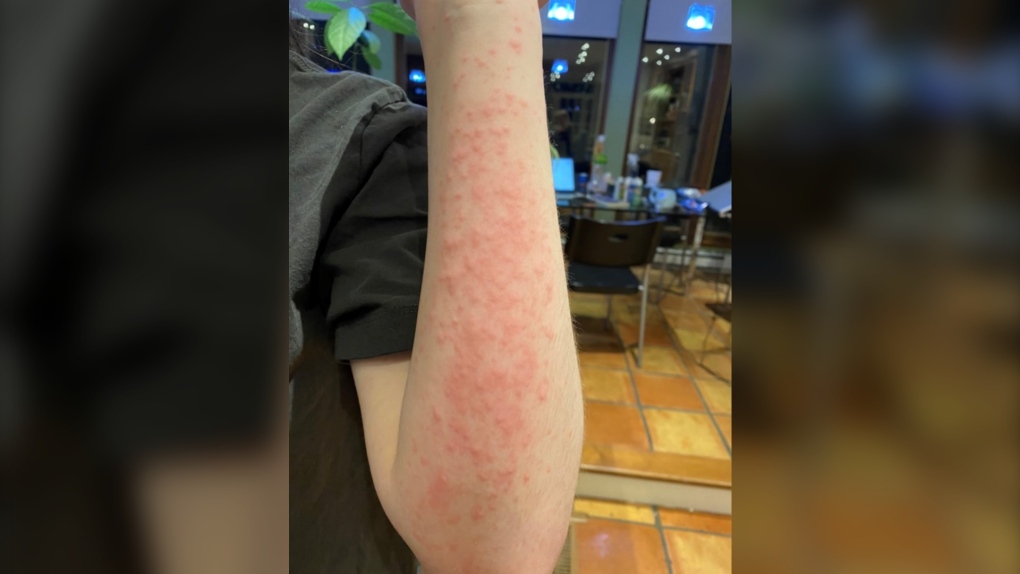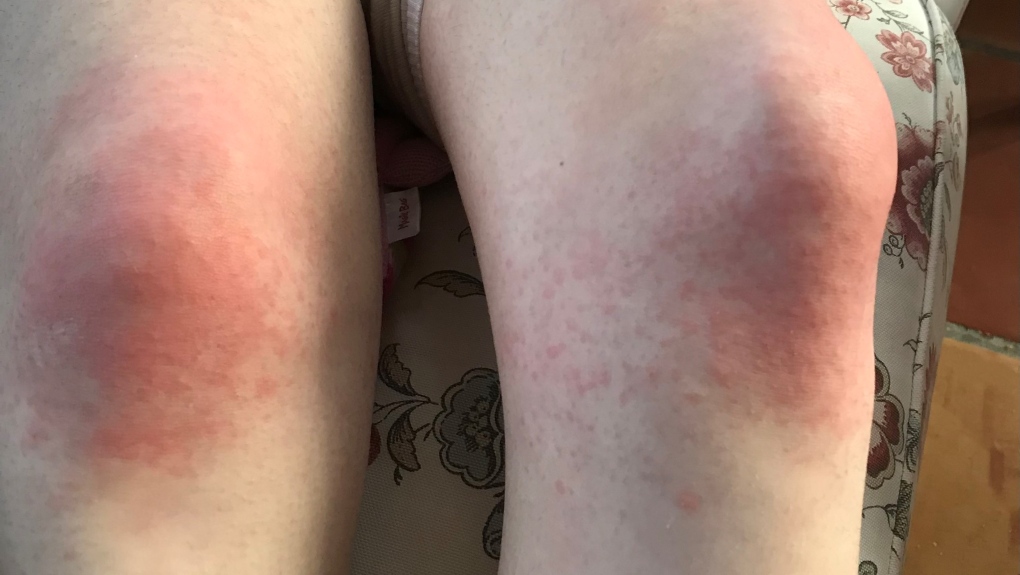Think you hate the cold? Meet the Montreal girl who's 'allergic' to it
Eryn Margolese’s routine before going outside this time of year would sound familiar to a lot of Montrealers.
“Depending on how cold it is, I'll wear two pairs of pants,” says the 15-year-old. “And I'll always wear, like, long sleeves, jackets, hat, gloves, scarves—everything.”
Nobody likes to be cold. But for Margolese, it’s not quite the same thing.
In 2020, she started getting a strange rash at odd times: raised, itchy red bumps on her skin that could take hours to go away. She tried to ignore it.
“I didn’t really know what was happening,” she said. “I just had some rash, and I was like ‘OK, that’s weird,’ and then it kept happening and I had no idea what it was.”
Finally, she went to “a bunch of doctors” and they tried to help. Maybe it was a kind of soap or laundry detergent she was reacting to, they theorized. But she hadn’t been using any new products.

Finally, an allergist at the Montreal Children’s Hospital had a new idea.
Dr. Moshe Ben-Shoshan took an ice cube and put it on Margolese’s arm. The rash quickly appeared, and he knew exactly what the problem was.
In such “ice cube tests,” he explained, “we wait five minutes and then we observe the development of hives aftewards.”
Margolese had come with a story he recognized, he said—“a classic story of going swimming or going outside in cold weather and developing hives.”
He broke the news to her: she was allergic to chilly temperatures, more or less, with a condition called cold urticaria. It’s not exactly an allergy, but a reaction to cold that looks a lot like an allergy and can even produce life-threatening anaphylaxis.
It affects about 30,000 Canadians, most of them young people, Ben-Shoshan told CTV News.
“Any one of us will get redness where we put the ice cube, but this patient will get hives,” he said.
“It looks like an allergy because you get the hives. But the trigger is not an allergen like peanut or… pollen,” he said.
“Basically the exposure to cold is assumed to generate an auto-allergen, so a substance that your immune system reacts to.”
Doctors are still trying to understand the condition, but it’s the substance produced within the sufferers’ bodies that creates the skin reaction.
“When you think about an allergy, you try to look for an external trigger that you can remove from your environment, like you know, a food… or a cat or a dog,” the doctor explained.
“This is different," he said. "In order to control it you need to control your internal environment by keeping your temperature warmer, by protecting your exposed surface areas, by taking antihistamines and in cases that are more severe,” having an epinephren injector.

For Margolese, the news was hard to hear. One of her main triggers wasn’t winter weather, but being at summer camp and swimming or boating every day in a cold lake, which she loved.
Now, she can’t do that the same way. She has to wade slowly in and pay attention to her reactions, Ben-Shoshan said—jumping in is not an option.
Anaphylaxis is rare in people with cold urticaria, with a review of 10 years of research showing it can happen in about 20 per cent of patients. But when such a severe reaction happens, it’s usually from quickly plunging into cold water or other very sudden temperature changes.
Margolese also takes antihistamines every day now and carries an emergency injector. Montreal winter also poses some special problems, she says.
“I'll sometimes walk my dog, but it'll be a much shorter walk and I'll go outside less,” she said.
Other things are surprising. She can eat cold treats like ice cream, but can’t necessarily hold onto a cold drink for a long time without protecting the skin on her hands.
The Montreal Children’s Hospital said in a release that the disorder affects girls slightly more commonly than boys.
Ben-Shoshan said the condition is more common in northern latitudes, including in Canada. It can last for a long time, often 10 years or more, and while for some people it goes away, for others it can last for life.
Margolese says that now that she’s had some time to live with the new precautions, she’s “used to it,” though not happy about having to give up cold pools and lakes.
And in winter, if Margolese’s family used to have to remind her, like many teens, to wear gloves or zip up her jacket, those days are long gone.
“I was never too cautious in the cold. It was kind of like if I'm walking from my house to my car, it's like whatever… having gloves is not a big issue,” she said.
Now, “I wouldn't slip up.”
CTVNews.ca Top Stories

'I just can't believe that it took so long': Body found in wreckage 3 months after deadly fire
A man accused of arson in a January Old Strathcona apartment fire is expected to be charged with manslaughter after a body was discovered in the burned building late last month.
No proof man lied to brother about number of kittens born in litter, B.C. tribunal rules
A man was denied a $5,000 payout from his brother after a B.C. tribunal dismissed his claim disputing how many kittens were born in a litter.
Quebec police hand out hundreds of tickets to Hells Angels and other bikers before 'first run' meeting
Quebec provincial police handed out hundreds of fines to Hells Angels members and other supporting motorcycle clubs who met for their 'first run' in a small town near Sherbrooke, Que.
Grandparents killed in wrong-way crash on Hwy. 401 identified
A 60-year-old man and a 55-year-old woman killed in a wrong-way crash on Highway 401 earlier this week have been identified by the Consulate General of India in Toronto.
Auston Matthews skates ahead of Game 7, status unclear with season on the line
Centre Auston Matthews of the Toronto Maple Leafs hasn't been ruled out of tonight's Game 7 against the Boston Bruins.
Snakes almost on a plane: U.S. TSA discovers a bag with small snakes in passenger's pants
According to an X post by the Transportation Security Administration, officers at the Miami International Airport found the small bag of snakes hidden in a passenger's trousers on April 26 at a checkpoint.
A Chinese driver is praised for helping reduce casualties in a highway collapse that killed 48
A Chinese truck driver was praised in local media Saturday for parking his vehicle across a highway and preventing more cars from tumbling down a slope after a section of the road in the country's mountainous south collapsed and killed at least 48 people.
Russia puts Ukrainian President Zelenskyy on its wanted list
Russia has put Ukrainian President Volodymyr Zelenskyy on its wanted list, Russian state media reported Saturday, citing the interior ministry’s database.
Britney Spears 'home and safe' after paramedics responded to an incident at the Chateau Marmont, source tells CNN
A source close to singer Britney Spears tells CNN that the pop star is 'home and safe' after she had a 'major fight' with her boyfriend on Wednesday night at the Chateau Marmont in West Hollywood.































